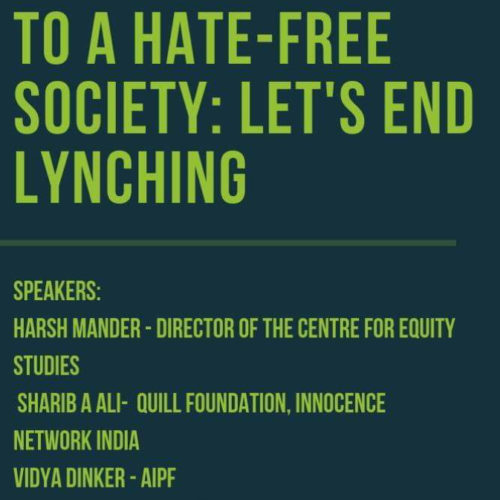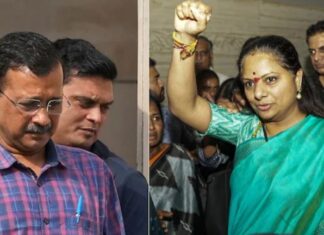On 16 July 2019, several Civil Society groups organized a panel talk at St. Josephs College Bengaluru to learn from the experiences of those who have been fighting the ever-rising number of cases of lynching in India. The event was called, Dwesha Mukta Samajadhade: Lynchinganna nilisonna (To a hate-free society: Let’s end lynching). The speakers were Harsh Mander, Director of the Centre for Equity Studies, Sharib Ali, from the Innocence Network and Quill Foundation, and Vidya Dinker, All India Progressive Forum.

Harsh Mander spoke about his journeys in the caravan of love (Karvan-e-Mohabbat), where they had visited the homes of families of victims of 29 lynchings. He shared disturbing patterns in the cases. The violence was indescribably cruel. There was an effort by the perpetrators to make it a public spectacle, often using video and social media. In this way, they showed how proud they were of their crimes. Rather than blame the criminal, there were accusations and charge-sheets against the victim and their families. Unlike earlier cases of communal violence, the people of the locality had no compassion or sympathy for the victim. Even in communal riots, there would be stories of people reaching across communal lines to help people be safe, but in lynching cases, there was nothing but contempt for the victim. While hatred against minorities is rising around the world, what makes the Indian brand unique is that it is built on almost a century of right-wing groups organizing on hate and division. Harsh Mander outlined the need for radical love to fight this radical hate. The caravan of love went on many journeys to express solidarity to the victims of lynching, ask for forgiveness on behalf of society and promise to tell their story.

Vidya Dinker described the cases from Dakshina Kannada (South Canara). As a district, it ranks number one district in the country in the number of hate crimes, making Karnataka rank number two after Uttar Pradesh. She described how the Bajrang Dal once attacked Muslim mango trader who has nothing to do with cattle under the pretext of protecting cows. Such groups strike with moral impunity which needs to be understood historically. Resistance has to be ongoing, by holding police and the judiciary accountable, and making sure they take notice and pursue the correct action against the aggressors.
Since there is no proper definition of a hate crime, most cases go unrecorded. It’s unclear how far back the violence goes. The RSS had established itself in Dakshina Kanara in 1941 and began cattle related movements from 1954. There is a lot of work to be done, to resist the effects of this long history.
 Sharib Ali of Quill Foundation, that is engaged in research and advocacy on issues of human rights, justice, and equity started by saying how complicated hate is.
Sharib Ali of Quill Foundation, that is engaged in research and advocacy on issues of human rights, justice, and equity started by saying how complicated hate is.
“We do not know what makes hate spread or how it stops. In India, there are nearly a thousand hate crimes every year, of which mob lynchings are about 15% of them. Most cases involve attacks by 1-3 people, which technically would not be called lynching since it lacks a mob. It may include vandalism to a church, and many include attempts to fuel hatred, like throwing a pig into a mosque. What hate-based attacks do is that they reorder society. They assert superiority by some groups over others. We can ask for a law, but that will not reverse the damage of this reordering. It may do a little to help, but what we need is a strengthening of institutions that protect those communities affected, and have packages that recognize the effects of this violence and this hate.
Institutions like the National Human Rights Commission are slow and can take up to 30 years to recognize the violence, if at all. When the global war on terror began, it became easy for the Indian establishment to equate Muslims with terrorism and began a campaign of hate. It included formal state violence, with the rise of encounter killings of Muslims, and less formal ways, like lynchings.
Citizens against hate (CAH), a collective of individuals and groups committed to a secular, democratic, caring India provides practical help to victims of hate crime, and to counter, through research, outreach, advocacy and litigation, hate in all its forms. In Sept 2017, CAH released a fact-finding Report into religiously motivated Vigilante Violence in India. The report can be found here.








